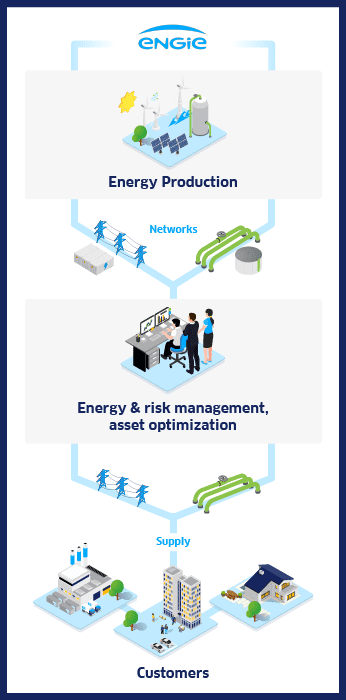
An energy value chain is the series of steps to produce a final product or service. In the energy sector, the energy value chain refers to converting primary energy sources into a usable and deliverable form of energy for end consumers.
Taking the image of a flowing river, the first steps of the value chain are often called the upstream part of the value chain, while the segments of the value chain close to the final customers are often called the downstream part of the chain. The segments in the middle of the value chain, between upstream and downstream, are sometimes called the midstream part of the value chain.
Upstream segment
The upstream segment of the energy industry encompasses activities related to the exploration, extraction and production of energy resources.
The exact upstream activities depend on the type of energy. In the oil and gas industry, the upstream activities will include the exploration and production of crude oil and natural gas. The upstream segment of the electricity value chain refers to the generation of electricity.
A midstream expert in the energy value chain
In the energy value chain midstream companies operate in transport and storage facilities of energy. It includes the infrastructure needed to move energy, such as pipeline systems, trucks, railways and ships.
But midstream activities are not limited to physical transport activities. In the natural gas sector for example, midstream can also refer to the activity of players who manage the value chain between supplier and customer. These midstreamers buy natural gas, pipeline gas or LNG from large suppliers, optimize their gas portfolio, and sell the gas to resellers or final customers.
In the power sector, the energy management activities taking place between the upstream power generation and the downstream retail activities can also be referred to as midstreamer activities.
ENGIE Global Energy Management & Sales is a leading midstream operator, both in gas and electricity. In 2022 it managed and supplied around 410 TWh of gas worldwide. On the power side, it had around 21 GW of renewable assets under management, both ENGIE assets and external assets, including 13 GW of wind and solar, and 8 GW of hydro (run of river and pumped storage). It had also around 33 GW of thermal power assets under management.
Downstream energy value segment
The downstream segment involves delivering usable products to end users. Downstream companies are primarily engaged in marketing and distribution activities. In the oil and gas sector it can also refer to the refining of petroleum products and the processing and purifying of raw natural gas.
ENGIE Global Energy Management & Sales is a leading global downstream player in the electricity and gas value chain. It has more than 190,000 business clients and in 2022 sold 208 TWh gas and 221 TWh electricity to B2B customers.
Accelerating the transition to a net zero energy value chain
One of the most pressing challenges for the energy value chain is to decarbonize and to transition to cleaner low-carbon and renewable energy sources. To accelerate this transition ENGIE Global Energy Management & Sales has a range of products and services to support customers and energy value chain actors on the path to Net Zero at every stage of the transition, from carbon reporting to 24/7 clean energy. This includes:
